Deck 22: Amines
Question
Question
Question
Question
Question
Question
Question
Question
Question
Question
Question
Question
Question
Question
Question
Question
Question
Question
Question
Question
Question
Question
Question
Question
Question
Question
Question
Question
Question
Question
Question
Question
Question
Question
Question
Question
Question
Question
Question
Question
Question
Question
Question
Question
Question
Question
Question
Question
Question
Question
Question
Question
Question
Question
Question
Question
Question
Question
Question
Question
Question
Question
Question
Question
Question
Question
Question
Question
Question
Question
Question
Question
Question
Question
Question
Question
Question
Question
Question
Question

Unlock Deck
Sign up to unlock the cards in this deck!
Unlock Deck
Unlock Deck
1/112
Play
Full screen (f)
Deck 22: Amines
1
What is the IUPAC name for the following compound? 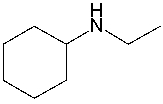
A) N-ethylhexanamine
B) N-ethylcyclohexanamine
C) N-cyclohexylethanamine
D) N-ethylcyclopentanamine
E) N-ethylaniline

A) N-ethylhexanamine
B) N-ethylcyclohexanamine
C) N-cyclohexylethanamine
D) N-ethylcyclopentanamine
E) N-ethylaniline
N-ethylcyclohexanamine
2
What is the common name for the following compound? 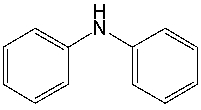
A) dibenzylamine
B) diphenylamine
C) dibenzeneamine
D) phenylbenzeneamine
E) none of these

A) dibenzylamine
B) diphenylamine
C) dibenzeneamine
D) phenylbenzeneamine
E) none of these
diphenylamine
3
What is the IUPAC name for the following compound? 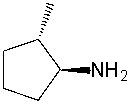

(1S,2S)-2-methylcyclopentanamine
4
What is the IUPAC name for the following compound? 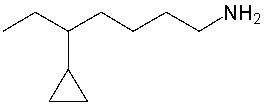


Unlock Deck
Unlock for access to all 112 flashcards in this deck.
Unlock Deck
k this deck
5
What is the common name for the following compound? 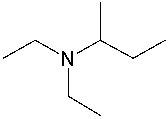
A) ethylmethylisobutylamine
B) diethylisobutylamine
C) sec-butyldiethylamine
D) 2-diethylaminobutane
E) sec-butyldimethylamine

A) ethylmethylisobutylamine
B) diethylisobutylamine
C) sec-butyldiethylamine
D) 2-diethylaminobutane
E) sec-butyldimethylamine

Unlock Deck
Unlock for access to all 112 flashcards in this deck.
Unlock Deck
k this deck
6
What is the common name for the following compound? 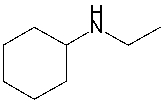
A) cyclopentylmethylamine
B) ethylhexylamine
C) cyclohexylethylamine
D) cyclohexylmethylamine
E) ethylhexylmethylamine

A) cyclopentylmethylamine
B) ethylhexylamine
C) cyclohexylethylamine
D) cyclohexylmethylamine
E) ethylhexylmethylamine

Unlock Deck
Unlock for access to all 112 flashcards in this deck.
Unlock Deck
k this deck
7
What is the structure for N,N-diethylaniline?

Unlock Deck
Unlock for access to all 112 flashcards in this deck.
Unlock Deck
k this deck
8
What is the IUPAC name for the following compound? 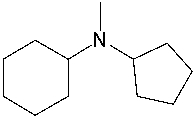
A) N-cyclopentyl-N-methylcyclohexanamine
B) N-cyclohexyl-N-methylcyclohexanamine
C) N-cyclopentyl-N-methylcyclopentanamine
D) cyclohexylcyclopentylmethylamine
E) N-pentyl-N-methylhexanamine

A) N-cyclopentyl-N-methylcyclohexanamine
B) N-cyclohexyl-N-methylcyclohexanamine
C) N-cyclopentyl-N-methylcyclopentanamine
D) cyclohexylcyclopentylmethylamine
E) N-pentyl-N-methylhexanamine

Unlock Deck
Unlock for access to all 112 flashcards in this deck.
Unlock Deck
k this deck
9
What is the structure for N-ethylbenzylamine?

Unlock Deck
Unlock for access to all 112 flashcards in this deck.
Unlock Deck
k this deck
10
Which of the following is a tertiary amine?
A) CH3CH2CH2CH2NH2
B) CH3CH2NHCH2CH(CH3)2
C) (CH3CH2)2NCH2CH(CH3)2
D) (CH3CH2)4N+ OH-
E) (CH3CH2)3CNH2
A) CH3CH2CH2CH2NH2
B) CH3CH2NHCH2CH(CH3)2
C) (CH3CH2)2NCH2CH(CH3)2
D) (CH3CH2)4N+ OH-
E) (CH3CH2)3CNH2

Unlock Deck
Unlock for access to all 112 flashcards in this deck.
Unlock Deck
k this deck
11
What is the IUPAC name for the following compound? 
A) 1-methyl-N-propyl-1-butananmine
B) 4-methyl-5-octanamine
C) 1-ethyl-N-propyl-1-pentanamine
D) N-butyl-2-pentanamine
E) N-methylpropyl-1-butanamine

A) 1-methyl-N-propyl-1-butananmine
B) 4-methyl-5-octanamine
C) 1-ethyl-N-propyl-1-pentanamine
D) N-butyl-2-pentanamine
E) N-methylpropyl-1-butanamine

Unlock Deck
Unlock for access to all 112 flashcards in this deck.
Unlock Deck
k this deck
12
What is the structure for 3-chloro-N-ethyl-1-pentanamine?

Unlock Deck
Unlock for access to all 112 flashcards in this deck.
Unlock Deck
k this deck
13
What is the IUPAC name for the following compound? 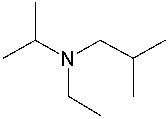
A) ethylisobutylisopropylamine
B) ethylisopropylbutylamine
C) sec-butylethylpropylamine
D) sec-butylethylisopropylamine
E) none of these

A) ethylisobutylisopropylamine
B) ethylisopropylbutylamine
C) sec-butylethylpropylamine
D) sec-butylethylisopropylamine
E) none of these

Unlock Deck
Unlock for access to all 112 flashcards in this deck.
Unlock Deck
k this deck
14
Which of the following is a primary amine?
A) CH3CH2CH2CH2NH2
B) CH3CH2NHCH2CH(CH3)2
C) (CH3CH2)2NCH2CH(CH3)2
D) (CH3CH2)4N+ OH-
E) (CH3CH2)3N
A) CH3CH2CH2CH2NH2
B) CH3CH2NHCH2CH(CH3)2
C) (CH3CH2)2NCH2CH(CH3)2
D) (CH3CH2)4N+ OH-
E) (CH3CH2)3N

Unlock Deck
Unlock for access to all 112 flashcards in this deck.
Unlock Deck
k this deck
15
What is the common name for the following compound? 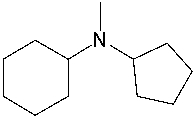
A) N-cyclopentyl-N-methylcyclohexanamine
B) N-cyclohexyl-N-methylcyclohexanamine
C) N-cyclopentyl-N-methylcyclopentanamine
D) cyclohexylcyclopentylmethylamine
E) N-pentyl-N-methylhexanamine

A) N-cyclopentyl-N-methylcyclohexanamine
B) N-cyclohexyl-N-methylcyclohexanamine
C) N-cyclopentyl-N-methylcyclopentanamine
D) cyclohexylcyclopentylmethylamine
E) N-pentyl-N-methylhexanamine

Unlock Deck
Unlock for access to all 112 flashcards in this deck.
Unlock Deck
k this deck
16
Classify the following compounds as a primary, secondary or tertiary amine. 


Unlock Deck
Unlock for access to all 112 flashcards in this deck.
Unlock Deck
k this deck
17
Which of the following is a secondary amine?
A) CH3CH2CH2CH2NH2
B) CH3CH2NHCH2CH(CH3)2
C) (CH3CH2)2NCH2CH(CH3)2
D) (CH3CH2)4N+ OH-
E) (CH3CH2)3CNH2
A) CH3CH2CH2CH2NH2
B) CH3CH2NHCH2CH(CH3)2
C) (CH3CH2)2NCH2CH(CH3)2
D) (CH3CH2)4N+ OH-
E) (CH3CH2)3CNH2

Unlock Deck
Unlock for access to all 112 flashcards in this deck.
Unlock Deck
k this deck
18
What is the IUPAC name for the following compound? 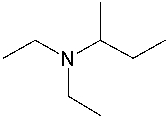
A) N,N,1-diethyl-1-ethanamine
B) N,N-diethyl-1-methyl-1-propanamine
C) 2,2-diethyl-2-butanamine
D) N,N-dimethyl-2-butanamine
E) N,N-diethyl-2-butanamine

A) N,N,1-diethyl-1-ethanamine
B) N,N-diethyl-1-methyl-1-propanamine
C) 2,2-diethyl-2-butanamine
D) N,N-dimethyl-2-butanamine
E) N,N-diethyl-2-butanamine

Unlock Deck
Unlock for access to all 112 flashcards in this deck.
Unlock Deck
k this deck
19
What is the structure for 1-butanamine?
A) CH3CH2CH2CH2NH2
B) CH3CH2NHCH2CH(CH3)2
C) (CH3CH2)2NCH2CH(CH3)2
D) (CH3CH2)4N+ OH-
E) (CH3CH2)3CNH2
A) CH3CH2CH2CH2NH2
B) CH3CH2NHCH2CH(CH3)2
C) (CH3CH2)2NCH2CH(CH3)2
D) (CH3CH2)4N+ OH-
E) (CH3CH2)3CNH2

Unlock Deck
Unlock for access to all 112 flashcards in this deck.
Unlock Deck
k this deck
20
Which of the following is a quaternary ammonium salt?
A) CH3CH2CH2CH2NH3+ Cl-
B) (CH3CH2)2NH2+ Cl-
C) (CH3CH2)3NH+ Cl-
D) (CH3CH2)4N+ Cl-
E) (CH3CH2)2NCH3
A) CH3CH2CH2CH2NH3+ Cl-
B) (CH3CH2)2NH2+ Cl-
C) (CH3CH2)3NH+ Cl-
D) (CH3CH2)4N+ Cl-
E) (CH3CH2)2NCH3

Unlock Deck
Unlock for access to all 112 flashcards in this deck.
Unlock Deck
k this deck
21
What is the IUPAC name for the following compound? 


Unlock Deck
Unlock for access to all 112 flashcards in this deck.
Unlock Deck
k this deck
22
Which one of the following is a stronger base? Explain why. 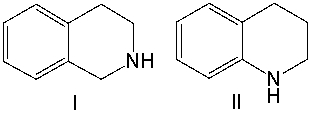


Unlock Deck
Unlock for access to all 112 flashcards in this deck.
Unlock Deck
k this deck
23
Arrange the following compounds in decreasing (strongest to weakest) order of basicity. 
A) I > III > II > IV
B) II > III > I > IV
C) IV > III > II > I
D) IV > I > II > III
E) II > I > IV > III

A) I > III > II > IV
B) II > III > I > IV
C) IV > III > II > I
D) IV > I > II > III
E) II > I > IV > III

Unlock Deck
Unlock for access to all 112 flashcards in this deck.
Unlock Deck
k this deck
24
Arrange the following compounds in increasing (weakest to strongest) order of basicity. 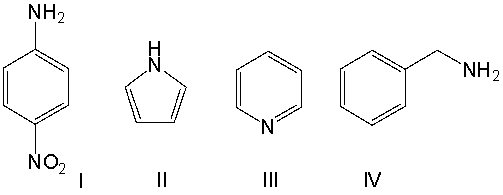
A) IV < II < I < III
B) III < II < IV < I
C) II < I < III < IV
D) II < III < I < IV
E) None of the above

A) IV < II < I < III
B) III < II < IV < I
C) II < I < III < IV
D) II < III < I < IV
E) None of the above

Unlock Deck
Unlock for access to all 112 flashcards in this deck.
Unlock Deck
k this deck
25
What is the IUPAC name for the following compound? 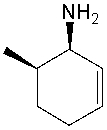


Unlock Deck
Unlock for access to all 112 flashcards in this deck.
Unlock Deck
k this deck
26
Which of the following compounds is least soluble in water? 
A) I
B) II
C) III
D) both I and III
E) none of these

A) I
B) II
C) III
D) both I and III
E) none of these

Unlock Deck
Unlock for access to all 112 flashcards in this deck.
Unlock Deck
k this deck
27
What is the IUPAC name for the following compound? 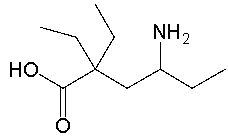


Unlock Deck
Unlock for access to all 112 flashcards in this deck.
Unlock Deck
k this deck
28
Identify the strongest base.
A) 4-chloroaniline
B) 4-nitroaniline
C) 4-aminobenzonitrile
D) aniline
E) 4-aminoanisole
A) 4-chloroaniline
B) 4-nitroaniline
C) 4-aminobenzonitrile
D) aniline
E) 4-aminoanisole

Unlock Deck
Unlock for access to all 112 flashcards in this deck.
Unlock Deck
k this deck
29
Which of the following compounds is most soluble in water? 
A) I
B) II
C) III
D) both I and II
E) all of these

A) I
B) II
C) III
D) both I and II
E) all of these

Unlock Deck
Unlock for access to all 112 flashcards in this deck.
Unlock Deck
k this deck
30
What is the common name for the following compound? 


Unlock Deck
Unlock for access to all 112 flashcards in this deck.
Unlock Deck
k this deck
31
What is the IUPAC name for the following compound? 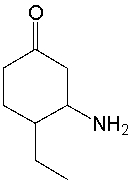


Unlock Deck
Unlock for access to all 112 flashcards in this deck.
Unlock Deck
k this deck
32
Arrange the following compounds in decreasing (highest to lowest) order of boiling point. 
A) III > I > IV > II
B) I > III > IV > II
C) I > IV > III > II
D) I > III > II > IV
E) III > I > II > IV

A) III > I > IV > II
B) I > III > IV > II
C) I > IV > III > II
D) I > III > II > IV
E) III > I > II > IV

Unlock Deck
Unlock for access to all 112 flashcards in this deck.
Unlock Deck
k this deck
33
Which of the following compounds is the strongest base? 
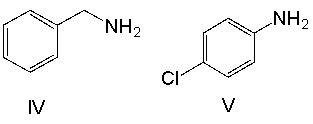
A) I
B) II
C) III
D) IV
E) V


A) I
B) II
C) III
D) IV
E) V

Unlock Deck
Unlock for access to all 112 flashcards in this deck.
Unlock Deck
k this deck
34
Arrange the following compounds in decreasing (strongest to weakest) order of basicity. 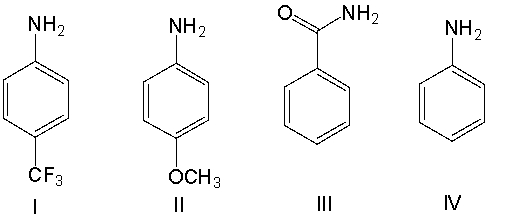
A) I > III > II > IV
B) II > III > I > IV
C) IV > III > II > I
D) IV > I > II > III
E) II > IV > I > III

A) I > III > II > IV
B) II > III > I > IV
C) IV > III > II > I
D) IV > I > II > III
E) II > IV > I > III

Unlock Deck
Unlock for access to all 112 flashcards in this deck.
Unlock Deck
k this deck
35
Identify the weakest base.
A) 4-chloroaniline
B) 4-nitroaniline
C) 4-aminobenzonitrile
D) aniline
E) 4-aminoanisole
A) 4-chloroaniline
B) 4-nitroaniline
C) 4-aminobenzonitrile
D) aniline
E) 4-aminoanisole

Unlock Deck
Unlock for access to all 112 flashcards in this deck.
Unlock Deck
k this deck
36
Arrange the following compounds in decreasing (strongest to weakest) order of basicity. 
A) I > III > II > IV
B) II > III > I > IV
C) IV > II > I > III
D) IV > III > II > I
E) II > I > IV > III

A) I > III > II > IV
B) II > III > I > IV
C) IV > II > I > III
D) IV > III > II > I
E) II > I > IV > III

Unlock Deck
Unlock for access to all 112 flashcards in this deck.
Unlock Deck
k this deck
37
Arrange the following compounds in decreasing (highest to lowest) order of boiling point. 
A) II > III > I
B) I > III > II
C) II > III > I
D) III > II > I
E) I > II > III

A) II > III > I
B) I > III > II
C) II > III > I
D) III > II > I
E) I > II > III

Unlock Deck
Unlock for access to all 112 flashcards in this deck.
Unlock Deck
k this deck
38
Rank the following compounds in decreasing (strongest to weakest) order of basicity. 
A) I > III > II > IV
B) II > III > I > IV
C) IV > II > III > IV
D) IV > III > II > I
E) III > II > I > IV

A) I > III > II > IV
B) II > III > I > IV
C) IV > II > III > IV
D) IV > III > II > I
E) III > II > I > IV

Unlock Deck
Unlock for access to all 112 flashcards in this deck.
Unlock Deck
k this deck
39
What is the IUPAC name for the following compound? 


Unlock Deck
Unlock for access to all 112 flashcards in this deck.
Unlock Deck
k this deck
40
What is the IUPAC name for the following compound? 


Unlock Deck
Unlock for access to all 112 flashcards in this deck.
Unlock Deck
k this deck
41
Provide the reagents necessary to carry out the following conversion. 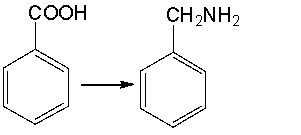


Unlock Deck
Unlock for access to all 112 flashcards in this deck.
Unlock Deck
k this deck
42
Provide the reagents necessary to carry out the following conversion. 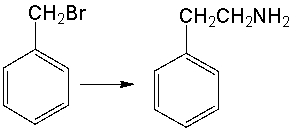


Unlock Deck
Unlock for access to all 112 flashcards in this deck.
Unlock Deck
k this deck
43
Predict the product for the following reaction. 


Unlock Deck
Unlock for access to all 112 flashcards in this deck.
Unlock Deck
k this deck
44
Predict the product for the following reaction. 



A) I
B) II
C) III
D) IV
E) V




A) I
B) II
C) III
D) IV
E) V

Unlock Deck
Unlock for access to all 112 flashcards in this deck.
Unlock Deck
k this deck
45
Predict the product for the following reaction. 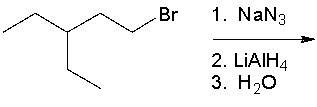


A) I
B) II
C) III
D) IV
E) III and IV



A) I
B) II
C) III
D) IV
E) III and IV

Unlock Deck
Unlock for access to all 112 flashcards in this deck.
Unlock Deck
k this deck
46
Predict the product for the following reaction. 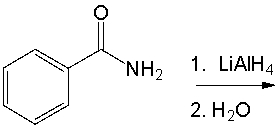


A) I
B) II
C) III
D) IV
E) V



A) I
B) II
C) III
D) IV
E) V

Unlock Deck
Unlock for access to all 112 flashcards in this deck.
Unlock Deck
k this deck
47
Predict the product for the following reaction. 


A) I
B) II
C) III
D) IV
E) V



A) I
B) II
C) III
D) IV
E) V

Unlock Deck
Unlock for access to all 112 flashcards in this deck.
Unlock Deck
k this deck
48
Predict the product for the following reaction and provide a stepwise, curved arrow mechanism for the formation of the product. 


Unlock Deck
Unlock for access to all 112 flashcards in this deck.
Unlock Deck
k this deck
49
Nicotine, present in tobacco, has the following structure. Which nitrogen is more basic and explain your choice. 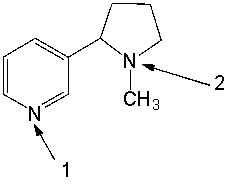


Unlock Deck
Unlock for access to all 112 flashcards in this deck.
Unlock Deck
k this deck
50
Predict the product for the following reaction. 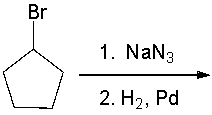


Unlock Deck
Unlock for access to all 112 flashcards in this deck.
Unlock Deck
k this deck
51
Predict the product for the following reaction sequence. 


Unlock Deck
Unlock for access to all 112 flashcards in this deck.
Unlock Deck
k this deck
52
Predict the product for the following reaction. 


A) I
B) II
C) III
D) IV
E) V



A) I
B) II
C) III
D) IV
E) V

Unlock Deck
Unlock for access to all 112 flashcards in this deck.
Unlock Deck
k this deck
53
Provide the reagents necessary to convert (S)-3-methyl-3-phenylpentanoic acid to (S)-3-methyl-3-phenylpentanamine.

Unlock Deck
Unlock for access to all 112 flashcards in this deck.
Unlock Deck
k this deck
54
Predict the product for the following reaction. 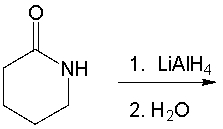
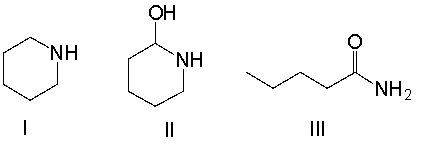

A) I
B) II
C) III
D) IV
E) V



A) I
B) II
C) III
D) IV
E) V

Unlock Deck
Unlock for access to all 112 flashcards in this deck.
Unlock Deck
k this deck
55
Provide the reagents necessary to carry out the following conversion for the following reaction. 


Unlock Deck
Unlock for access to all 112 flashcards in this deck.
Unlock Deck
k this deck
56
Chloroquine is used as an antimalarial drug. Rank the three nitrogen atoms in decreasing (strongest to weakest) order of basicity. 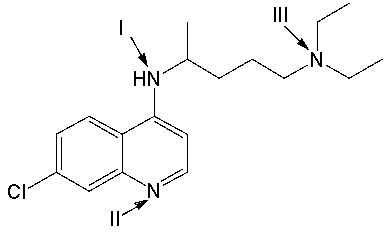
A) III > I > II
B) I > III > II
C) II > I > III
D) I > II > III
E) III > II > I

A) III > I > II
B) I > III > II
C) II > I > III
D) I > II > III
E) III > II > I

Unlock Deck
Unlock for access to all 112 flashcards in this deck.
Unlock Deck
k this deck
57
Predict the product for the following reaction. 


A) I
B) II
C) III
D) IV
E) V



A) I
B) II
C) III
D) IV
E) V

Unlock Deck
Unlock for access to all 112 flashcards in this deck.
Unlock Deck
k this deck
58
Predict the product for the following reaction. 


A) I
B) II
C) III
D) IV
E) V



A) I
B) II
C) III
D) IV
E) V

Unlock Deck
Unlock for access to all 112 flashcards in this deck.
Unlock Deck
k this deck
59
Pyridoxamine, aka vitamin B6, has the following structure. Which nitrogen is more basic? Explain your choice. 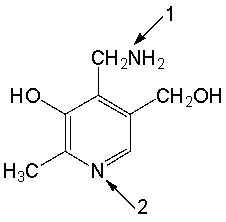


Unlock Deck
Unlock for access to all 112 flashcards in this deck.
Unlock Deck
k this deck
60
Provide the reagents necessary to carry out the following conversion. 
A) H2 and Ni
B) 1. LiAlH4
2) H2O
C) Fe and HCl
D) Zn and HCl
E) all of these

A) H2 and Ni
B) 1. LiAlH4
2) H2O
C) Fe and HCl
D) Zn and HCl
E) all of these

Unlock Deck
Unlock for access to all 112 flashcards in this deck.
Unlock Deck
k this deck
61
Predict the major product for the following reaction. 

A) I
B) II
C) III
D) IV
E) I and III


A) I
B) II
C) III
D) IV
E) I and III

Unlock Deck
Unlock for access to all 112 flashcards in this deck.
Unlock Deck
k this deck
62
The ________ reaction is used to prepare primary amines by using potassium phthalimide. This reaction proceeds by a ________ mechanism.

Unlock Deck
Unlock for access to all 112 flashcards in this deck.
Unlock Deck
k this deck
63
Predict the product for the following reaction. 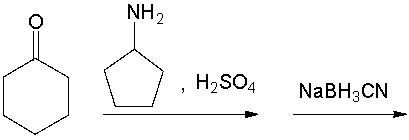
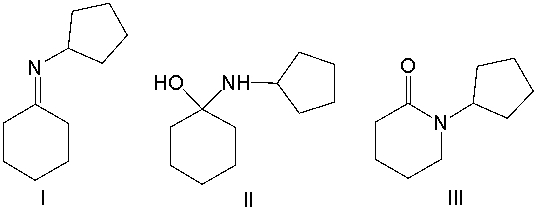
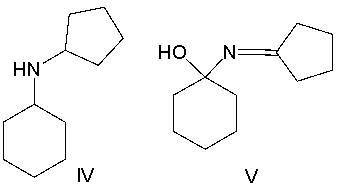
A) I
B) II
C) III
D) IV
E) V



A) I
B) II
C) III
D) IV
E) V

Unlock Deck
Unlock for access to all 112 flashcards in this deck.
Unlock Deck
k this deck
64
Which of these alkyl halides cannot be used to prepare amines using Gabriel synthesis?
A) 1-bromopentane
B) 1-bromo-3-methylbutane
C) 2-bromo-3-methylpentane
D) 1-bromo-2,3-dimethylbutane
E) 2-bromo-2,3-dimethylbutane
A) 1-bromopentane
B) 1-bromo-3-methylbutane
C) 2-bromo-3-methylpentane
D) 1-bromo-2,3-dimethylbutane
E) 2-bromo-2,3-dimethylbutane

Unlock Deck
Unlock for access to all 112 flashcards in this deck.
Unlock Deck
k this deck
65
Provide a stepwise synthesis of 3-amino-2-methylpentane using the Gabriel synthesis.

Unlock Deck
Unlock for access to all 112 flashcards in this deck.
Unlock Deck
k this deck
66
Provide the structures of the products in each step of the following reaction sequence. 


Unlock Deck
Unlock for access to all 112 flashcards in this deck.
Unlock Deck
k this deck
67
Provide the reagents necessary to carry out the following conversion. 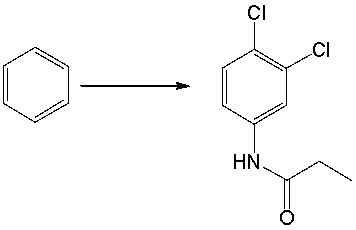


Unlock Deck
Unlock for access to all 112 flashcards in this deck.
Unlock Deck
k this deck
68
Predict the product for the following reaction sequence. 

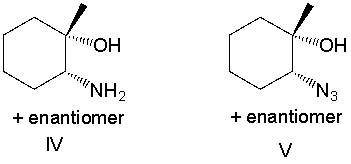
A) I
B) II
C) III
D) IV
E) V



A) I
B) II
C) III
D) IV
E) V

Unlock Deck
Unlock for access to all 112 flashcards in this deck.
Unlock Deck
k this deck
69
Predict the product(s) for the following reaction. 


A) I
B) II
C) III
D) IV
E) V



A) I
B) II
C) III
D) IV
E) V

Unlock Deck
Unlock for access to all 112 flashcards in this deck.
Unlock Deck
k this deck
70
Predict the product for the following reaction sequence. 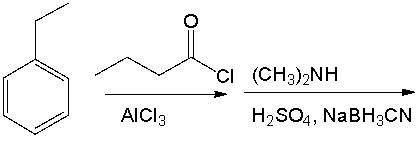
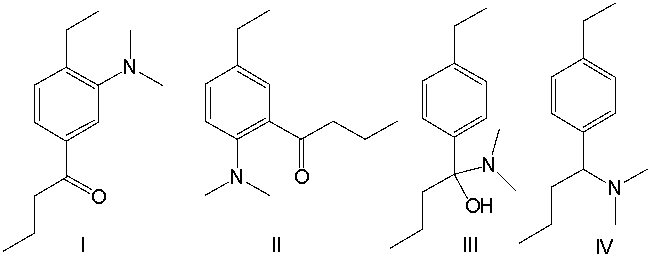
A) I
B) II
C) III
D) IV
E) none of these


A) I
B) II
C) III
D) IV
E) none of these

Unlock Deck
Unlock for access to all 112 flashcards in this deck.
Unlock Deck
k this deck
71
Provide the reagents necessary to carry out the following conversion. 


Unlock Deck
Unlock for access to all 112 flashcards in this deck.
Unlock Deck
k this deck
72
Predict the product for the following reaction. 


A) I
B) II
C) III
D) IV
E) V



A) I
B) II
C) III
D) IV
E) V

Unlock Deck
Unlock for access to all 112 flashcards in this deck.
Unlock Deck
k this deck
73
Provide the reagents necessary to carry out the following conversion. 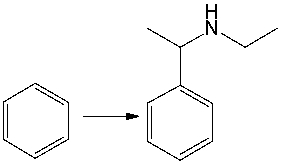


Unlock Deck
Unlock for access to all 112 flashcards in this deck.
Unlock Deck
k this deck
74
Provide the reagents necessary to carry out the following conversion. 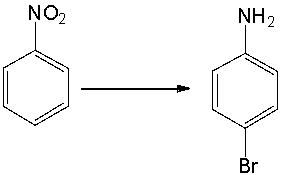


Unlock Deck
Unlock for access to all 112 flashcards in this deck.
Unlock Deck
k this deck
75
Provide a stepwise synthesis of 1-cyclopentylethanamine using the Gabriel synthesis.

Unlock Deck
Unlock for access to all 112 flashcards in this deck.
Unlock Deck
k this deck
76
Provide the structures of the products in each step of the following reaction sequence. 


Unlock Deck
Unlock for access to all 112 flashcards in this deck.
Unlock Deck
k this deck
77
Predict the major product for the following reaction. 


A) I
B) II
C) III
D) IV
E) V



A) I
B) II
C) III
D) IV
E) V

Unlock Deck
Unlock for access to all 112 flashcards in this deck.
Unlock Deck
k this deck
78
Predict the product(s) for the following reaction. 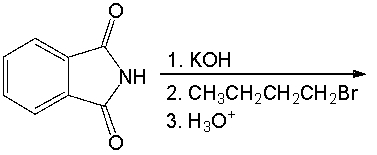
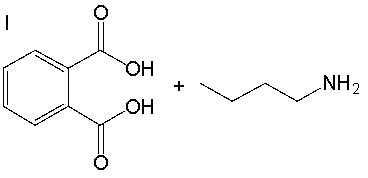
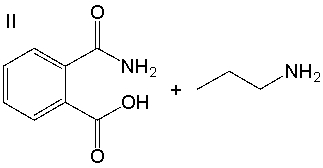
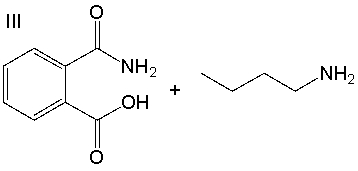
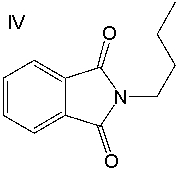
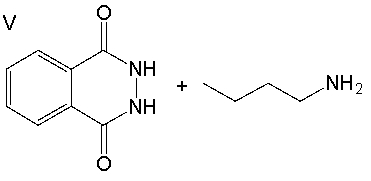
A) I
B) II
C) III
D) IV
E) V






A) I
B) II
C) III
D) IV
E) V

Unlock Deck
Unlock for access to all 112 flashcards in this deck.
Unlock Deck
k this deck
79
Predict the product for the following reaction sequence. 


Unlock Deck
Unlock for access to all 112 flashcards in this deck.
Unlock Deck
k this deck
80
Predict the product for the following reaction. 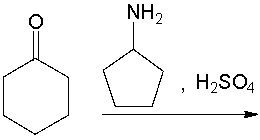
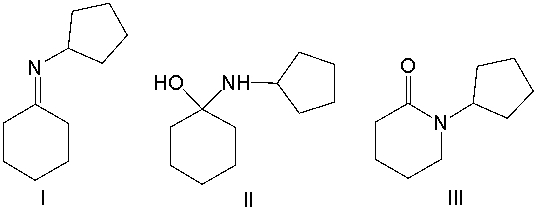
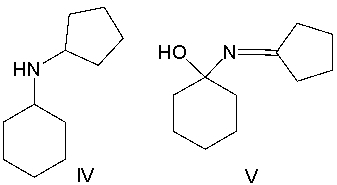
A) I
B) II
C) III
D) IV
E) V



A) I
B) II
C) III
D) IV
E) V

Unlock Deck
Unlock for access to all 112 flashcards in this deck.
Unlock Deck
k this deck


